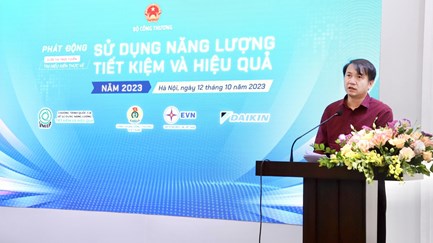Wednesday, 04/02/2026 | 00:07 GMT+7

On October 12, 2023, in Hanoi, the Energy Conservation Steering Committee Office (Ministry of Industry and Trade), in collaboration with relevant units, organized the launch ceremony of the online competition 'Study on energy efficiency and conservation in 2023'.
 The 9th VEPG Steering Committee Meeting: Strengthening Coordination for Viet Nam’s Just Energy Transition
The 9th VEPG Steering Committee Meeting: Strengthening Coordination for Viet Nam’s Just Energy Transition
 Develop sales and marketing strategies for energy efficiency equipment and solution suppliers
Develop sales and marketing strategies for energy efficiency equipment and solution suppliers
 Enhancing capacity for Bac A Bank Officers in Risk Sharing Facility Implementation
Enhancing capacity for Bac A Bank Officers in Risk Sharing Facility Implementation
 Capacity Building for Program Implementing Entity
Capacity Building for Program Implementing Entity
 Promoting Energy Efficiency for Technical Staff of Brick and Ceramic Sector
Promoting Energy Efficiency for Technical Staff of Brick and Ceramic Sector


























 Energy Efficiency and Conservation: Technology as the “Key”
Energy Efficiency and Conservation: Technology as the “Key”
 Energy-saving solutions and green transition promotion
Energy-saving solutions and green transition promotion
 Opening of the 2025 Energy-Efficient Equipment and Green Transition Exhibition Fair
Opening of the 2025 Energy-Efficient Equipment and Green Transition Exhibition Fair
 Consultation on the methodology for developing and updating energy consumption standards for four major industrial sectors
Consultation on the methodology for developing and updating energy consumption standards for four major industrial sectors
 Develop sales and marketing strategies for energy efficiency equipment and solution suppliers
Develop sales and marketing strategies for energy efficiency equipment and solution suppliers
 The 9th VEPG Steering Committee Meeting: Strengthening Coordination for Viet Nam’s Just Energy Transition
The 9th VEPG Steering Committee Meeting: Strengthening Coordination for Viet Nam’s Just Energy Transition